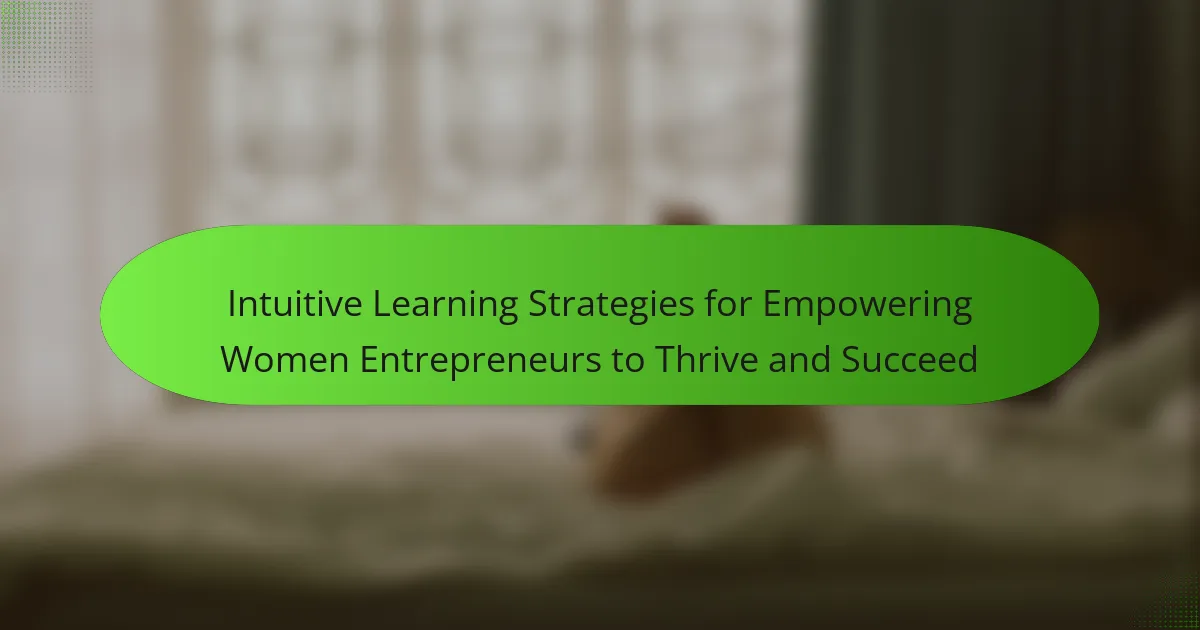Education is crucial for women entrepreneurs, providing the skills and knowledge necessary for success. This article explores how education enhances business acumen, fosters confidence, and builds networks. It highlights unique resources like mentorship programs and online courses tailored for women. Additionally, it discusses best practices for continuous learning and the importance of networking in driving entrepreneurial success.

How does education empower women entrepreneurs?
Education empowers women entrepreneurs by providing essential skills and knowledge needed for success. Access to education enhances business acumen, fosters confidence, and builds networks. Studies show that educated women are more likely to start businesses and create jobs. Furthermore, education equips women with the ability to innovate and adapt in competitive markets, leading to sustainable growth. As a result, investing in women’s education is crucial for economic development and gender equality.
What skills are essential for success in entrepreneurship?
Essential skills for success in entrepreneurship include strategic thinking, adaptability, financial literacy, and effective communication. These competencies empower women entrepreneurs to navigate challenges, seize opportunities, and build sustainable businesses. Strategic thinking enables long-term planning, while adaptability allows for responsive decision-making in dynamic markets. Financial literacy ensures informed budgeting and investment choices, and effective communication fosters collaboration and networking. Each skill contributes to a holistic approach to entrepreneurship, driving growth and innovation.
Which educational programs focus on entrepreneurial skills?
Many educational programs focus on entrepreneurial skills, particularly those designed for women entrepreneurs. Programs like the Women’s Business Centers in the U.S. offer training in business management and financial literacy. Additionally, organizations such as SCORE provide mentorship and workshops tailored to women-led startups. Online platforms like Coursera and edX also feature courses on entrepreneurship, covering essential skills such as marketing, finance, and leadership. These programs empower women by enhancing their entrepreneurial capabilities and fostering confidence in business ventures.
How can mentorship enhance learning for women entrepreneurs?
Mentorship significantly enhances learning for women entrepreneurs by providing tailored guidance and support. It fosters skill development, boosts confidence, and expands professional networks. Women who engage in mentorship often report improved decision-making abilities and increased business acumen. Studies show that 70% of mentored individuals achieve higher career success, highlighting mentorship’s unique role in empowering women entrepreneurs.
What role does networking play in educational success?
Networking significantly enhances educational success by providing opportunities for collaboration, mentorship, and resource sharing. Building connections with peers and mentors can lead to access to valuable knowledge and skills. For women entrepreneurs, networking can specifically empower them by fostering community support and sharing experiences. Studies show that women who engage in networking are more likely to secure funding and mentorship, which are crucial for business growth. This unique attribute of networking highlights its role in overcoming barriers faced by women in entrepreneurship.
How can women leverage networking opportunities?
Women can leverage networking opportunities by actively participating in industry events, joining professional organizations, and utilizing online platforms. Building relationships with mentors enhances access to resources and knowledge. Engaging in collaborative projects fosters connections and visibility. Research indicates that women who network effectively increase their chances of business success significantly.
What are the barriers to education for women entrepreneurs?
Barriers to education for women entrepreneurs include cultural norms, financial constraints, lack of access to resources, and inadequate support systems. These obstacles hinder women’s ability to gain essential skills and knowledge. Cultural expectations often prioritize traditional roles over education, limiting opportunities. Financial barriers restrict access to training programs and educational resources. Additionally, insufficient mentorship and networking opportunities further isolate women from vital entrepreneurial support. Addressing these barriers is crucial for empowering women entrepreneurs and fostering economic growth.
How can financial constraints impact educational pursuits?
Financial constraints significantly hinder educational pursuits by limiting access to resources and opportunities. Many women entrepreneurs face barriers such as tuition fees, learning materials, and training programs. These financial limitations prevent them from acquiring essential skills and knowledge, which are crucial for business success. As a result, the gap in educational attainment widens, perpetuating cycles of inequality. Addressing these constraints is vital to empower women and foster economic growth.
What cultural factors influence women’s access to education?
Cultural factors significantly impact women’s access to education. Societal norms often prioritize male education, limiting resources for girls. In some cultures, early marriage and child-rearing responsibilities hinder educational pursuits. Additionally, lack of female role models in education can discourage girls from pursuing academic paths. Economic constraints further exacerbate these challenges, as families may prioritize boys’ education over girls’.

What unique educational resources are available for women entrepreneurs?
Women entrepreneurs can access unique educational resources such as mentorship programs, online courses, and networking events tailored to their needs. These resources enhance skills, foster connections, and provide industry insights.
Mentorship programs connect women with experienced entrepreneurs, offering guidance and support. Online courses focus on essential business skills, including finance, marketing, and leadership, often designed specifically for women. Networking events create opportunities to meet peers and potential investors, fostering collaboration and growth.
Additionally, organizations like the Women’s Business Enterprise National Council provide certifications and resources that empower women-owned businesses. These initiatives collectively contribute to a supportive ecosystem that promotes women’s success in entrepreneurship.
Which organizations support women’s education in entrepreneurship?
Various organizations support women’s education in entrepreneurship by providing resources, mentorship, and funding. Notable examples include the Global Fund for Women, which focuses on women’s rights and empowerment, and the Women’s Business Enterprise National Council, which promotes women-owned businesses. The Cherie Blair Foundation for Women offers training programs and networking opportunities. Additionally, organizations like the United Nations Entity for Gender Equality and the Empowerment of Women advocate for women’s economic participation globally. These organizations play a crucial role in enhancing women’s skills and knowledge in entrepreneurship.
What innovative online platforms provide entrepreneurial education?
Innovative online platforms providing entrepreneurial education include Coursera, Udemy, and Skillshare. These platforms offer courses tailored for women entrepreneurs, focusing on essential skills such as business management, marketing, and finance. For example, Coursera partners with universities to provide accredited courses, enhancing credibility. Udemy features a diverse range of practical skills, allowing women to learn at their own pace. Skillshare emphasizes community-based learning, connecting women with mentors and peers. These platforms empower women with knowledge, fostering entrepreneurial success.

What are the rare educational opportunities for women in business?
Women in business face rare educational opportunities that can significantly enhance their entrepreneurial skills. Programs focused on leadership development, mentorship, and access to funding are essential. For instance, initiatives like women-only business incubators provide tailored support, fostering a unique environment for growth. Additionally, scholarships aimed specifically at women in business education are increasingly available, addressing financial barriers. Networking events designed exclusively for women entrepreneurs also create invaluable connections, promoting collaboration and knowledge sharing.
How do scholarships specifically for women entrepreneurs work?
Scholarships specifically for women entrepreneurs provide financial aid to support their business education and development. These scholarships often focus on enhancing skills and knowledge necessary for entrepreneurial success. They may cover tuition, materials, or mentorship programs. Unique attributes include targeted support for women in various industries and networking opportunities with successful female entrepreneurs. As a result, these scholarships empower women to overcome barriers and thrive in business.
What are the benefits of participating in women-focused business competitions?
Participating in women-focused business competitions offers numerous benefits that empower women entrepreneurs. These competitions provide access to valuable mentorship, networking opportunities, and resources that enhance skills and knowledge.
Competitors gain exposure to industry leaders, which can lead to partnerships and funding opportunities. Additionally, these competitions often focus on unique attributes such as innovation and social impact, encouraging participants to develop creative solutions to real-world problems.
As a result, women entrepreneurs can build confidence, refine their business strategies, and increase their visibility in the marketplace. Ultimately, these competitions serve as a catalyst for personal and professional growth, fostering a supportive community of like-minded individuals.

What best practices can women entrepreneurs adopt for effective learning?
Women entrepreneurs can adopt several best practices for effective learning. First, they should seek mentorship from experienced leaders to gain insights and guidance. Networking with other entrepreneurs fosters knowledge sharing and collaboration. Engaging in continuous education, such as workshops and online courses, enhances skills relevant to their business. Setting specific learning goals helps track progress and maintain focus. Additionally, embracing feedback from peers and customers leads to improvement and innovation. By applying these strategies, women entrepreneurs can empower themselves through knowledge and skills, driving success in their ventures.
How can women create a personalized learning plan for entrepreneurship?
Women can create a personalized learning plan for entrepreneurship by assessing their skills, identifying goals, and selecting relevant resources. First, evaluate current skills and knowledge gaps. Next, set specific, measurable objectives related to business goals. Then, choose educational resources such as online courses, workshops, or mentorship programs tailored to those objectives. Regularly review progress and adjust the plan as needed to ensure continuous growth and adaptation in the entrepreneurial landscape.
What common mistakes should women avoid in their educational journey?
Women should avoid underestimating their potential and neglecting networking opportunities in their educational journey. Many women hesitate to seek mentorship, which is crucial for growth. Additionally, they often struggle with imposter syndrome, doubting their qualifications. Failing to set clear goals can lead to a lack of direction, while not prioritizing time management may result in overwhelming stress. Lastly, avoiding participation in discussions can limit their visibility and influence in academic settings.
What strategies can enhance retention of entrepreneurial knowledge?
To enhance retention of entrepreneurial knowledge, women entrepreneurs can employ active learning strategies. These include practical application of skills, networking with peers, and mentorship programs. Engaging in real-world projects solidifies knowledge and fosters confidence. Collaborative learning environments promote shared experiences, enhancing understanding and retention. Regular reflection on lessons learned further reinforces knowledge retention.



